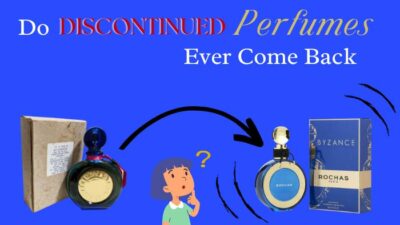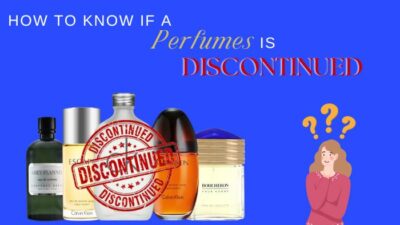I know it is hard to believe that there was an era in this world when people did not know what perfume truly meant.
Even though people started making scents from very early times in history, the form and availability were different.
Perfumes were one of the symbols that people used to disguise class. As they were rare and expensive, only upper-class people could afford them. It was a sign of nobility to wear scent. Different religions had specific scents to symbolize purity.
To know every detail about the history of perfumes, keep keeping till the end.
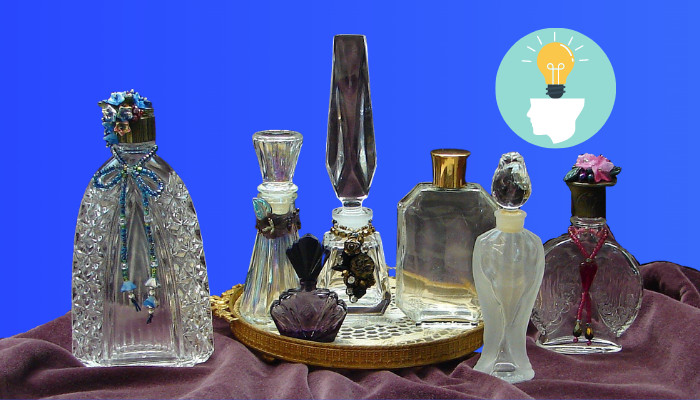
Why was perfume invented?
The invention of perfume began with the ancient Egyptians. The idea of having a pleasant aroma around you started from the concept of religion. Egyptians wanted their praying room to smell nice while worshiping their God. That is why they began burning essential oils, resin, and perfumed unguents.
They believe it would bring protection and kindness to them. Over time, scents were also added to people’s daily life. And as the usage of fragrances increased, they started importing fine woods, scented resins, myrrh, and incense which were needed to produce perfumes from the Middle East.
What is the history of perfume?
The Latin term “per fumus,” which means “through smoke,” is where the word “perfume” originates. The practice of creating perfume is referred to as perfumery.
Later, the French updated the word to become “parfum,” which refers to the aromas created by burning incense resin.
It is no surprise that religion has brought many concepts into the world, and scent is one of them. It all started in ancient Egypt to communicate with Gods, seduce, display wealth, or pure pleasure for thousands of years.
Women would run into lilac gardens to get the scent on them and even wrap the lilies in cloth and twist the material around two sticks above a large vessel to squeeze out the water or oil required to extract the perfume from the flower.
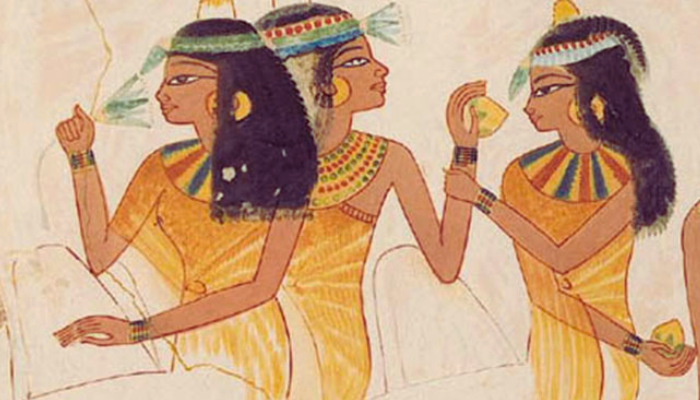
Not only lilac. Egyptians would use other elements like rose, cinnamon, parsley, lemongrass, and myrrh.
Ancient Egypt, Greece, Rome, where rosewater floated in fountains, and France, where Louis XIV’s court was known as “La Cour Parfumée,” with the king wanting a fresh smell for every single day, are all stages of the beautiful journey of perfume.
However, modern perfumes are made quite differently. Instead of completely using original elements, perfumers mix synthetic ingredients produced in the lab but smell the same.
What is the purpose of perfume?
Everything we do in life has a purpose; even as small as applying perfume on yourself has its reasons. It gives us a voice without even uttering a word and helps us to express our personality on a different level.
Here are the primary purposes of perfume:
Fragrance: Of course, perfume is used mainly because of its fragrance which helps you keep your foul odor away from your surroundings. It makes you feel happy and fresh throughout the day.
Positive mood: Wearing a perfume would light up your mood immediately. It almost works like therapy. Many scientific types of research have shown that certain scents can change your mindset and “promote behavior.” Therefore, always wear a perfume that gives you happiness and helps you to bring the best version of yourself.
Confidence booster: Perfume helps you to gain confidence like no other product. A few scent spritzes can reshape your personality. Choose a cologne that fits your personality, can lift your spirits, and will help you be ready for any situation that may arise in your life.
Increases attractiveness: It is always desirable when the person you like is wearing perfume. When you complete your look with a few spritzes of your favorite perfume, people would have to turn around and look at you.
Health booster: Perfumes can improve mood by reducing stress and other anxiety-related problems.
Triggers memories: A particular type of smell you have smelt before will bring back all the related memories without you even realizing it. It reminds you of the good memories and makes you feel nostalgic.
Aromatherapy: The therapeutic properties of fragrances and essence scents are inherent. The phrase “Aroma Therapy” was created. These scents guarantee your stress levels are in control and safe. Lavender also helps with insomnia.
Cures headaches: Perfumes contain essential oils and other active compounds that help cure awful headaches.
Who invented perfume?
The first perfumer in history was a woman from ancient Babylon in Mesopotamia named Tapputi. On a Cuneiform tablet from 1200 BCE, she is still mentioned.
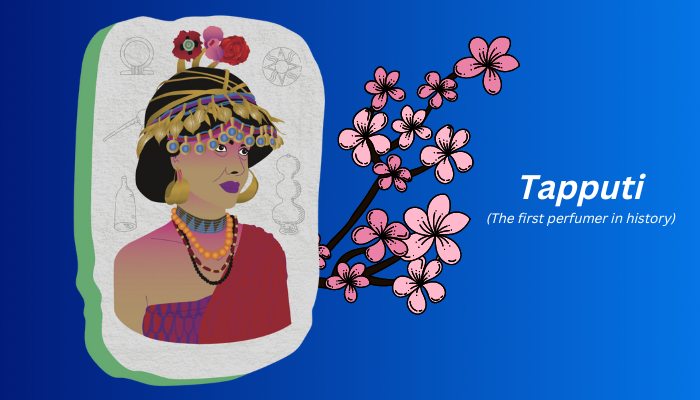
As the Mesopotamian Royal Palace administrator, she held a significant position in the Mesopotamian government and religion. She created techniques for smell extraction that served as the foundation for perfume production. Her most innovative approach, using solvents, was one of the techniques she recorded and passed on.
The first ever modern perfume was Hungary Water. This perfume blended lemon, orange blossom, thyme, and rosemary notes. It was made for Queen Elizabeth of Hungary in 1370.
Old perfumes which still have production:
- Muelhens Muelhens Mäurer & Wirtz 4711: It was invented by Wilhelm Muelhens and has been in production since 1799. The primary notes include lemon, neroli, jasmine, basil, and orange.
- Farina’s Cologne Water Kölnisch Wasser: It has introductory notes, which were developed by Johann Maria Farina and have been in production since 1709, are lemon, orange, tangerine, neroli, and lavender.
How were perfumes made in ancient times?
Here are some ancient timelines which had significant growth in perfumes:
Egyptian perfume: As mentioned earlier, Egypt has a lot to do with the formation of fragrance. Egypt Methalogy even has a lord of perfume called ‘God Nefertem’, who would carry lilies with him, which were used as one of the most common ingredients of perfumes back then. Incense was always used in ceremonies, and it was even traded internationally. The queens of Egypt used to spray perfume every day and took them to their graves.
Persian perfume: Persians were equivalently obsessed with scents as well. They were the ones who created non-oil-based perfumes and ruled the trading of them for hundreds of years. The fragrance was a sign of nobility. All the kings used to have their signature scent, which no one else was allowed to use. King Persepolis Darius even was pictured holding his bottles of perfume or incense. King Xerxes has also been pictured with Lily of the Valley flowers, often used in fragrances.
Greek perfume: During this time, scent stops being used in religious rites and starts to become a part of everyday life for the average person. In addition to continuing to accompany sacred rituals and significant events like births, marriages, and funerals, the scent is now in profane settings. It is associated with the concept of beauty and self-care, and it is in this way that it becomes a significant factor in daily life.
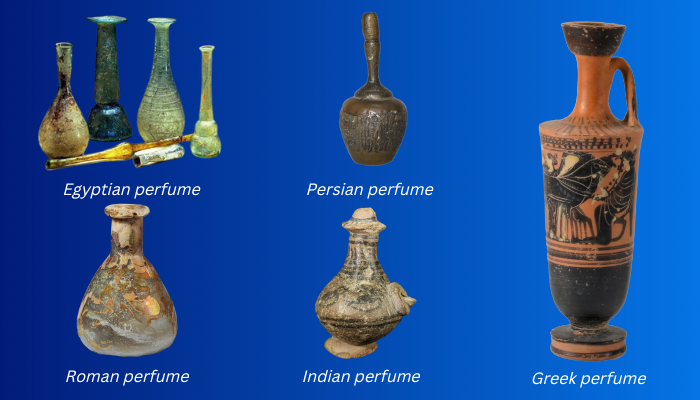
Roman perfume: Romans documented how they made perfumes very carefully, which is why they are being recreated to date. There were other uses for fragrance than ceremonial ones. It played a significant role in Rome’s development from a tiny farming community to a world center. Romans utilized a considerable amount of fragrance in body care products, including balms, oils, and perfumes for their skin and hair, and in their public bathhouses to scent the water. Some Romans, including Pliny, the Elder, decried perfumes for excessive use. Such luxury was outlawed when Rome was destroyed, and the scent did not become widely used in Europe for hundreds of years.
Indian and Chinese perfume: The use of fragrance in ceremonies and temples was central to the mystical Indian Tantric rituals. In particular areas like houses and places of worship, they also utilized perfume. The Chinese also employed scent to purify and sterilize spaces because they thought it might help stave off disease. They paid more attention to hiring fragrances to scent the environment around them than to adorn their bodies with it. Noble Chinese started using personal fragrances and imported ingredients during the Sui and Song dynasties.
Medival Euporian perfume: At this point, aroma began to evolve into a fashionable item. Both men and women in Europe would dress in perfumed garments and wigs. People started adding more sophisticated substances like musk, civet, and ambergris from animals. They were used to mask the smell of body odors because taking frequent baths was still taboo. Because it made the higher classes more distinct, perfume was famous.
Conclusion
Perfume has a wild past. It was invented in ancient Egypt and is still becoming more vital than ever. Its development through different eras is magnificent. Even its use has changed with time.
No matter what the use was, to worship or to remove bad odor, its value in society will always be seen as nobility.
If you have any further queries, please feel free to ask them in the comment section, and I would be happy to answer them.


